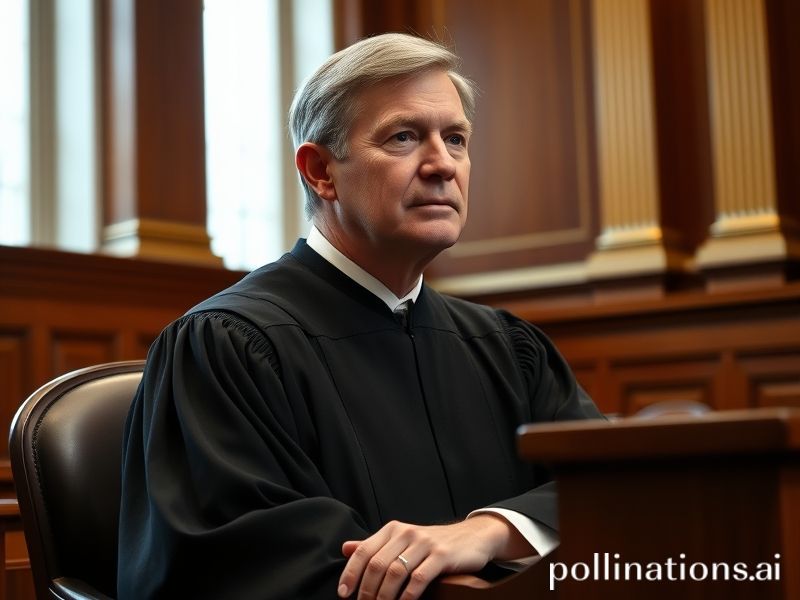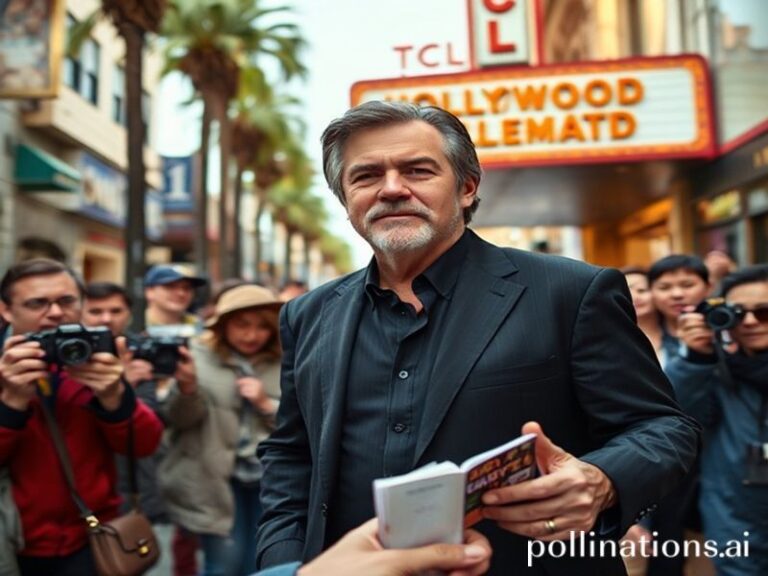John Roberts: The Quiet American Shipping Constitutional Chaos Abroad
Chief Justice John Roberts is a man who, for reasons best known to himself, decided to spend his twilight years refereeing a constitutional demolition derby in which every contestant is driving a monster truck labeled “Originalism,” “Stare Decisis,” or “Whatever Gets Me on the 6 o’clock News.” From Lagos to Lisbon, bureaucrats, barristers, and bored teenagers doom-scrolling on the metro share one quiet certainty: whatever the Supreme Court of the United States coughs up next, it will land in their inboxes as an export-grade precedent faster than you can say “extraterritorial effect.”
Roberts has the global charisma of a Swiss tax auditor—deliberately so. While other branches of the U.S. government tweet themselves into international punch-lines, the Chief Justice traffics in parchment and footnotes, the kind of paperwork dictators pretend to read before they rubber-stamp their own constitutions. Yet his signature, tucked neatly under the stylized eagle of the Court, still wields the imperial reach once reserved for gunboats and missionaries. Ask the Mexican factory that just got sued under U.S. antitrust theory, or the French privacy activist who discovered that American “freedom of speech” now means “freedom for my speech, not yours.” They’ll tell you Roberts is less a judge than a customs officer deciding which constitutional cargo gets waved through the green lane.
Internationally, Roberts is viewed the way one views an unexploded shell in a wheat field: with respectful distance and the morbid knowledge that it might still blow up next harvest. In Singapore—where judges speak in polite, numbered paragraphs instead of thunderbolts—law clerks study his opinions like Kabuki scripts: all that stylized anguish over “judicial modesty” while the ground beneath shifts unmistakably rightward. In Kenya, Supreme Court Justice Martha Koome has openly cited Roberts’s Shelby County reasoning to justify why voter-roll purges are really just administrative hygiene. Nothing says “soft power” quite like other nations adopting your legal loopholes as their own.
Of course, every empire needs its mythology. Roberts plays the institutionalist who just wants to keep the marble façade from cracking, a sort of architectural conservator with lifetime tenure. The irony, richly appreciated from Berlin to Buenos Aires, is that preservation can look remarkably like demolition if you simply redefine the termites as “original public meaning.” While European courts fret about climate change and algorithmic discrimination, Roberts’s Court is busy rediscovering 18th-century gunsmiths as the last word on 21st-century mass shootings—an approach that thrills libertarian think tanks in London almost as much as it horrifies pediatricians in Rio.
Then there is the money. American jurisprudence has become the world’s most lucrative spectator sport, complete with betting markets on how many commas the next opinion will contain. Multinationals from Shenzhen to Stockholm pay top dollar for ex-clerks who can translate Roberts-ese into actionable risk memos: “Likelihood of Chevron deference being torched? 73 %. Hedge accordingly.” The Chief Justice, ever the tactician, knows that every time he narrows administrative agency power, he widens the offshore loophole. It’s globalization’s version of the butterfly effect—except the butterfly is wearing a black robe and charging $2,000 an hour.
Roberts’s greatest trick, however, may be convincing the planet that the Supreme Court is above politics while simultaneously deciding cases that read like donor thank-you notes. Foreign observers—especially those whose own judiciaries were gift-wrapped by departing colonial powers—find this hypocrisy oddly comforting. If even the Americans can’t keep law and politics in separate cages, maybe the whole experiment was rigged from the start. It’s the jurisprudential equivalent of learning that the Michelin-starred chef survives on instant ramen: perversely reassuring.
In the end, Chief Justice Roberts stands at the intersection of two grand traditions: American exceptionalism and human fallibility. The rest of the world watches, half-horrified, half-awed, as he balances precedent and power like a juggler on a unicycle rolling across a minefield—knowing that when he drops a ball, the shrapnel rarely stays within U.S. borders. And so we raise a glass of whatever imported whiskey best approximates stoicism and toast the man who reminds us, quarterly, that parchment is flammable but influence is forever.







